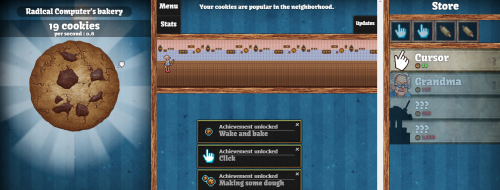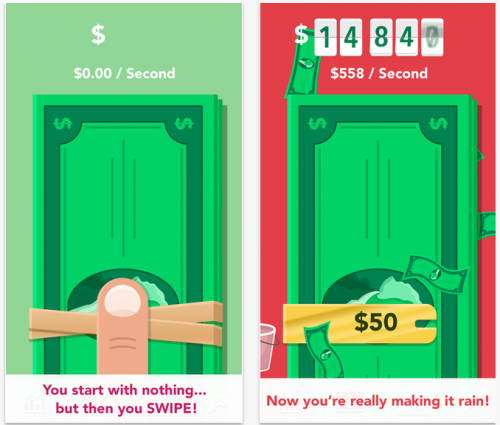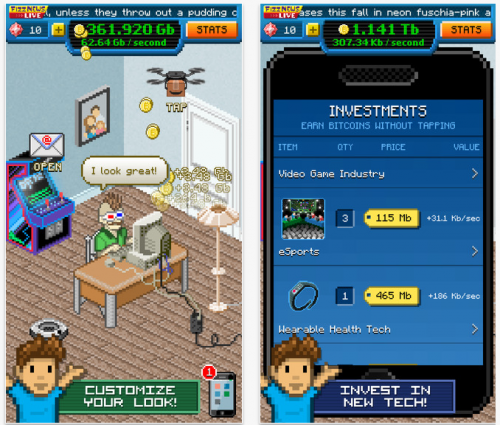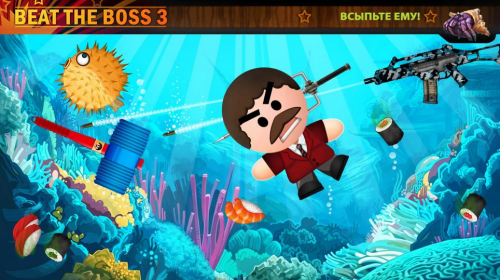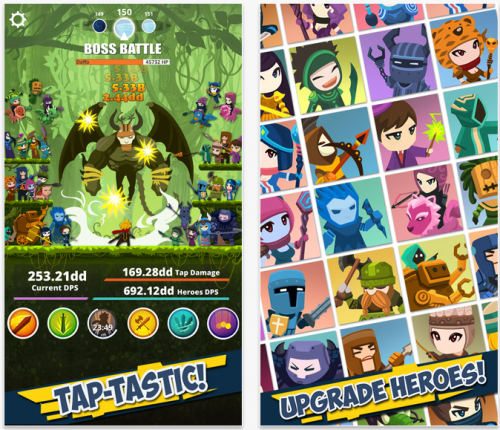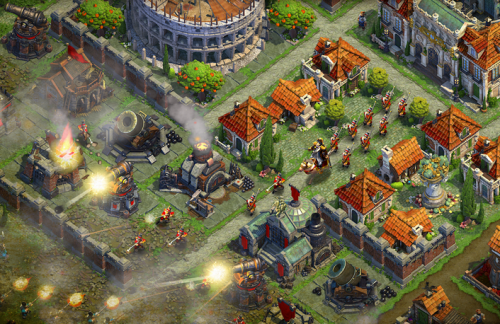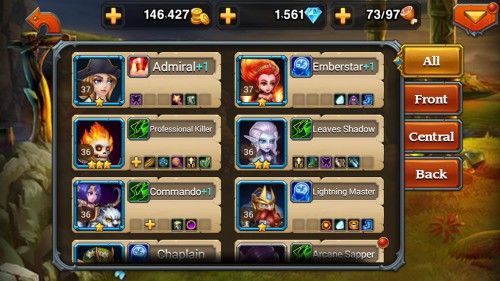What is the trouble with clickers and why there are not enough of them for traditional time managers – we analyze in a new voluminous editorial material.
The appearance of this article was preceded by a number of events. We can say that the domino principle has worked. In short, it all started with the fact that the Tap Titans role-playing clicker was released in the App Store and Google Play. The game managed to live undelivered for two months on my smartphone until the release of a post about it by game scriptwriter Yaroslav Singaevsky. In his short article, Yaroslav not only talked about the game, which is described below, but also raised the question of whether clickers will become the next explosive genre. The repost of the link to the material on Facebook led to a heated discussion of the topic, which led me to some thoughts.
About cookies
Clickers (aka “cookies”) are a very specific genre built on accumulation and delegation at the same time.
Cookie Clicker (web version)
At the first stages of the game, in order to get a certain result, the user needs to perform some simple action. For example, tap on the liver to collect it. Cookies when collected either become a resource itself, or give a soft game currency, which is spent on the purchase of auxiliary tools that collect cookies automatically. The more similar tools there are, the faster cookies accumulate. Accordingly, the need for any actions on the part of the player, apart from the acquisition of new tools, disappears quite quickly. Because, no matter how many clicks, it is physically impossible to make, for example, 3000 pieces of cookies per second.
This is one of the two root problems of the genre. What the project starts with, its important game component at the first stages of acquaintance – over time simply leaves the game cycle. Along with it, the need for the user to participate in what is happening is gradually disappearing.
On the one hand, of course, it remains. To increase the speed of collecting cookies, you still need a player. But since the main goal for him is still the construction of new tools, and he does not take direct part in the construction, apart from pressing the button, the significance of his role is leveled, at least in his own eyes. And this is the second problem.
Because of this, games of this kind, as a rule, become boring and boring very quickly.
Returning to the project (where there is only an opportunity to look at how many abstract billions you have earned since the last session, and rebuild another factory) is not the most attractive time to spend. Especially if the actions possible in the game are the very minimum.
The fact that such games do not have a high retention rate, however, rarely scares developers away. The fact is that at the other “pole” there is a low entry threshold. The player almost does not need to understand the rules. He gets the first fan right away – just by tapping on the screen and for this he gets either a cookie, or a well-fed monster, or a slain dragon, or something else.
Due to this, there is a chance to “go out” on positioning. Most likely, this happened to be done by the authors of the ironic Make it Rain, who stirred up the Western press with a message that their game earns about $ 50 thousand a day. Recall that dollars act as cookies in the project, and the player not only prints them, but also invests, for example, by hiring lobbyists in the senate or local politicians.
Make it Rain
Bitcoin Billionaire has gained popularity on the popularity of bitcoins and on the graphic design that is not the most original for such games, where the player is either a novice investor, or a geek who decided to make money on a new digital currency.
Bitcoin Billionaire
But have these games become real long-term hits?
No, they can’t be found now either in high positions in the download charts or in the box office tops. Although, it must be said that Make it Rain reached the 16th position in the American box office top in the App Store, and Bitcoin Billionaire 57th place in the British box office.
By the way, the first game in this genre, Cookie Clicker, released in August 2013 on the web, had a very good DAU in the month of release, it reached the mark of 200 thousand people. But the Android version of the games, released by redBit games studio in September of the same year, currently has a download window somewhere between 1 million and 5 million. A good figure, but by no means for the project-the founder of a new genre that will “blow up” digital stores.
Cookie Clicker
Most clickers earn not on in-game payments, but on advertising. The fact is that there is really no incentive or sense to pay in clickers. There is no need to wait for the “readiness” of the building, everything happens instantly. The time when enough resources are accumulated for a new tool can always be reduced by buying a cheaper tool. And anyway, everything happens here by itself and quickly, why?
In general, despite the frequent releases of projects of this kind, it usually makes no sense to talk about them. Neither in terms of downloads, nor in terms of cash, they are very rarely of interest.
But what if you look at them from a slightly different angle?
Tap Titans
The development of Game Hive Corporation, famous for the Beat the Boss series, a variation of Talking Tom, in which you don’t have to stroke the cat, but destroy the boss by various means, demonstrated a different, if you want, creative view of the dead-end genre.
Beat the Boss
The key difference between the game and the host of “cookies” is that the game tap itself does not give anything. Tap Titans has a game character who strikes monsters. One tap is one hit. The strength of the latter is determined by the leveling of the character.
Tap Titans
Pumping is carried out for soft currency. Currency is given for the destruction of monsters, which are not always easy to kill (not because they resist, just their life span can amount to trillions of HP). You can also use money to buy other heroes who will automatically attack monsters and pump various combat skills that work after activation for a limited amount of time.
It is clear that, in the end, the problems of the genre of innovation have not been solved, because at a certain stage all these showdowns with the same monsters in the same ways begin to tire, but in the new interpretation, the project already looks more like a kind of farm with a specific incentive: it is necessary to “gore” the next boss, look at a new game location, see what else there are heroes in the game, and, if possible, pump them up.
Actually, this led me to a certain, not the most difficult, thought, which just passed against the background of delight (premature) from the next clone of Clash of Clans, just not from some unknown Chinese office, but from the Big Huge Games resurrected by the phoenix.
DomiNations
The authors of DomiNations have a very solid gaming experience behind them. The founder of the studio, Brian Reynolds, was the lead designer of Civilization II, Sid Meier’s Alpha Centauri, Rise of Nations and many other projects. And the novelty can be called the quintessence of all this experience on the basis of the gameplay familiar to all mobile players. In other words, these are “clashes”, pumped up to the eyeballs with new, curious ideas. I don’t want to dwell on this particular project right now, but there is one crucial moment in the game for me.
DomiNations
At first, while there are no farms or they generate resources for a long time, and the army is just being built, the player has something to occupy himself in the game, namely, hunting. This could well be called a game within a game.
Living creatures are constantly darting around the perimeter of the game base, for the extraction of which residents can be directed. Hunting doesn’t happen instantly, but it usually definitely lasts less than a minute. So the player gets additional entertainment, which minimally affects the process (the animals bring a solid amount of resources only by the standards of the first gaming sessions), but does not carry a critical value. In other words, this case can be easily thrown out of the game cycle.
But what does clickers have to do with it?
Meta games
For me personally, one of the significant problems of many modern time managers is the lack of, let’s say, entertaining gameplay. To use the terminology of Michial Katkoff, I am bored in a farm or a builder where there is no meta-game.
“The meta-game is another component that can increase the session to hardcore indicators (in butler, you can spend hours on drawing up a deck, in Clash of Clans – the same hours on thinking through the defense). This is an invisible part of the game cycle, a part of the game in which the player does not earn any resources, but remains involved, optimizing his game progress.”
For clarity, here is another newer example – Heroes Charge (which is actually an American copy-paste clone of a Chinese game that has just been released in Western stores under the name Dot Wars).
Heroes Charge
The game has the ability to release up to five heroes into the arena at the same time. But there are a lot more heroes, so you can mess around with them for a long time, choose, study their characteristics, craft weapons for them, and so on, so a rather boring process at some stage acquires depth.
This very fuss is also a meta-game.
It is clear that it hardly makes sense to integrate such mechanics into projects designed for a wide audience, but a clicker more or less complicated in the manner of Tap Heroes – why not?
In what capacity is another question, the answer to which depends on what goals are set for a particular project: to increase the length of the session or to create a new monetization point?
It is clear that I proceed from my own experience, according to which I can often like this or that project very much, but while something is being built in it (or even if everything is built), I often find myself with absolutely nothing to do in it. In fact, the game thus expels me, a la: “friend, until the next session.” And there again a couple of clicks, admiring and … see you again.
We all understand that mobile games should have a short session. But does this mean that we should forget about those who can spend more time with her now?
I don’t think so. And the clicker in this case is one of the possible solutions.

